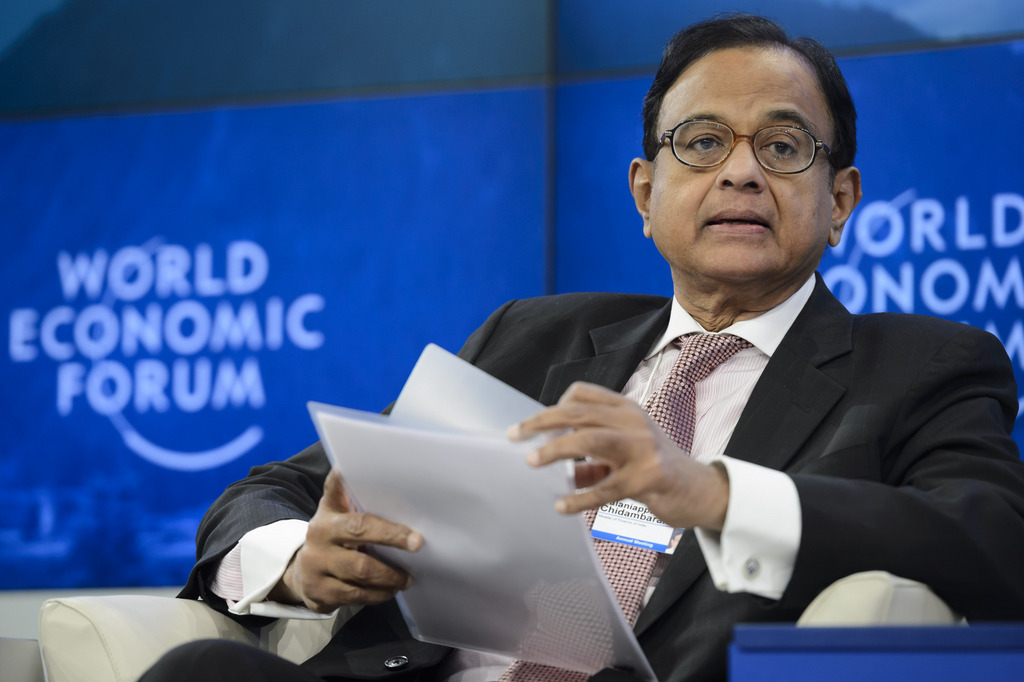‘Black money’ problem stalks Indian elections

As elections get underway in India this week, much of the campaigning debate has centered around corruption, the flood of illicit money fleeing the country and the tax havens, like Switzerland, that are believed to shelter these assets.
“Black money leaving the country has become a symbolic issue during the elections,” Arun Kumar, a professor of economics at Jawaharlal Nehru University in New Delhi, told swissinfo.ch. “People are demanding that the trillions of dollars that have gone to tax havens over the last 70 years are brought back. If that happens, people believe their tax burden can be reduced.”
For decades, successive governments have been blamed for being more a part of India’s ‘black money’ problem than solving it. Observers are sceptical if anything will come of the hard line being taken by the incumbent regime towards Switzerland or if promises by other political parties to crack down on tax evasion will bear fruit after the election.
“While there is a lot of show at the moment, whether politicians will actually do anything about it is another matter,” Kumar explained.
The current impasse between Switzerland and India over administrative assistance to help track Indian tax evaders is centered on Switzerland’s refusal to cooperate on matters involving stolen bank data.
India’s request for assistance appears to derive from data stolen from the Geneva branch of HSBC by former employee Hervé Falciani.
Falciani sold a CD of client names to the French authorities who have since passed the details on to other countries. Some 782 names are of Indian nationals, according to Swiss media reports.
The Swiss authorities were once renowned for hiding behind banking secrecy in practically every call from other countries to share information in the hunt for tax cheats.
Since the 2008 financial crisis, Switzerland has been forced by the international community to relax its stance and renegotiate dozens of double tax treaties.
However, Switzerland has stood firm against fishing expeditions (seeking data without enough evidence of wrongdoing) or evidence derived from illegally obtained sources.
Stolen data became a real problem for Switzerland in the years after the financial crash, with ex-bank employees turned whistleblowers selling client information, particularly to the German authorities.
The Swiss finance ministry has confirmed the letters it has received from India finance minister P Chidambaram and said that a reply would be sent ‘soon’, without revealing the contents of the response.
As recently as January, Swiss finance minister Eveline Widmer-Schlumpf reiterated Switzerland’s rejection of administrative assistance based on stolen data.
Dead end request
In recent weeks, Indian finance minister Palaniappan Chidambaram has been publically turning up the heat on Switzerland with increasing demands on the Swiss to hand over information on suspected tax cheats.
But Switzerland has steadfastly refused to cooperate on the grounds that India is acting on data stolen from the Geneva branch of HSBC. Nonetheless, Chidambaram has vowed to take further action through the G20 while his office gives journalists access to correspondence sent to his Swiss counterpart.
The Indian media has reacted with some scathing responses. “While trying to emulate the track record of the US and other countries that have successfully collected taxes and prosecuted hidden offshore accounts, [India’s tax authorities] show no appreciation of the spadework that goes into a successful anti-evasion campaign,” the Indian Express newspaper said in an editorial last month.
More column inches have been dedicated to recent Supreme Court criticism of the government’s efforts to get on top of the black money problem.
Tainted politicians
Measuring the amount of black money sloshing around India is a difficult task given that it is prevalent in all walks of life and that people do not advertise their attempts to cheat the tax authorities.
Kumar, who has authored a book on the phenomenon, believes that it is growing and currently accounts for half of India’s gross domestic product (GDP: $1.8 trillion or CHF1.6 trillion).
The authorities are coy about publicising their own calculations, but hint that the sum of money being passed under the table is shrinking and is now no more than 20% of GDP.
The general public perception is that many politicians, government and local authority officials are also tainted with the smell of corruption , according to Kumar.
“Traditionally, political parties have benefited from corruption when building their finances, particularly during elections,” he said. So I doubt they will do anything to curb this phenomenon.”
Kumar’s research suggests that most money illegally derived from bribes, kickbacks for public contracts, undeclared cash payments or corporate accountancy tricks remains in the country. Only around 10% ever leaves India, he argued, and some of those assets later return after being laundered.
Black money outflows
Putting exact figures black money exiting the country is even harder than gauging the total volume generated thanks to the ingenuity of opaque financial structures such as shell companies and trusts.
The figure being touted around by the Indian media is around $1.4 trillion currently lying in foreign accounts. But the Washington-based NGO Global Financial Integrity (GFI) puts the figure at nearly three times higher – $3.4 trillion. Neither of these figures can be conclusively verified.
Furthermore, GFI believes the trend of illicit money pouring out of India is on the increase. By comparing Indian trade statistics with international trading partners, GFI estimates that black money flowing out of India reached $34 billion in 2011. In 2002 it was under $8 billion.
By far the biggest scam, according to GFI, is Indian firms using shady offshore shell companies to pay over the odds for goods and then pocketing the difference.
Put own house in order
GFI chief economist Dev Kar, who hails from India, argues that while clamping down on offshore tax havens is a laudable exercise, the Indian government should be doing far more to reform tax laws and clean up domestically. That exercise could start by making the tender process for government contracts, such as infrastructure projects, more transparent.
“Of course India needs to take a strong position in the international forum but there are a whole slew of internal reforms that are necessary to make things more transparent,” Kar told swissinfo.ch. “Making strong noises against Switzerland during the election campaign is just kicking the can down the road to avoid responsibility.”
“Every government says it will bring the money back, but this is shutting the stable door once the horse is bolted. It is far too simple to move assets out of the country. The rule of law and order and corporate governance needs cleaning up in India from top to bottom.”
with input from Priti Patnaik

In compliance with the JTI standards
More: SWI swissinfo.ch certified by the Journalism Trust Initiative



You can find an overview of ongoing debates with our journalists here. Please join us!
If you want to start a conversation about a topic raised in this article or want to report factual errors, email us at english@swissinfo.ch.